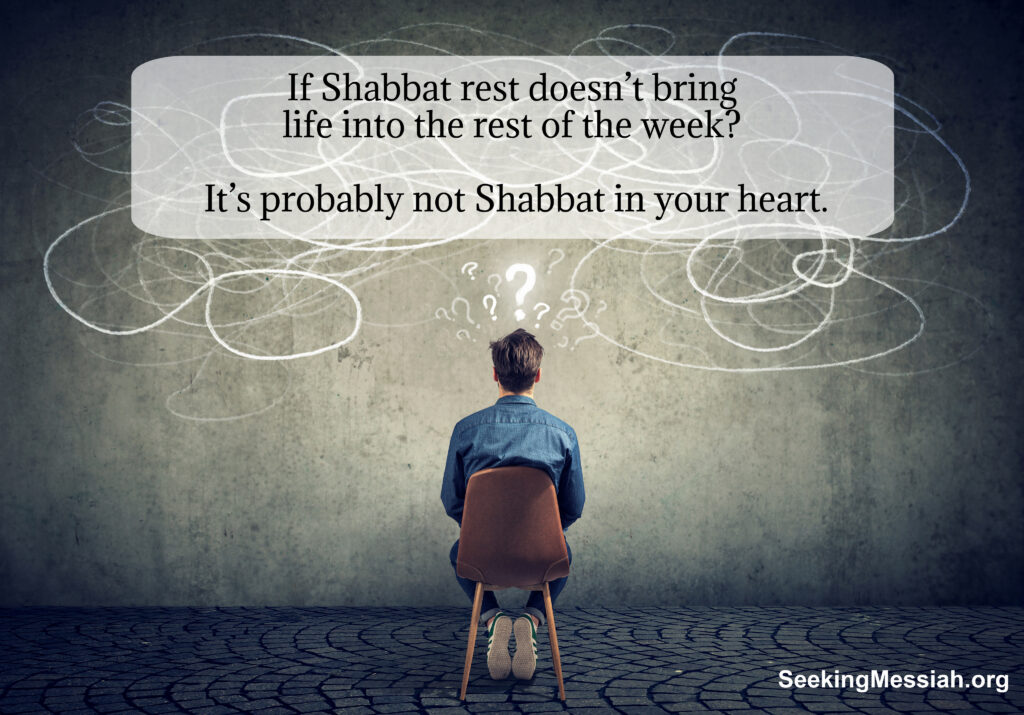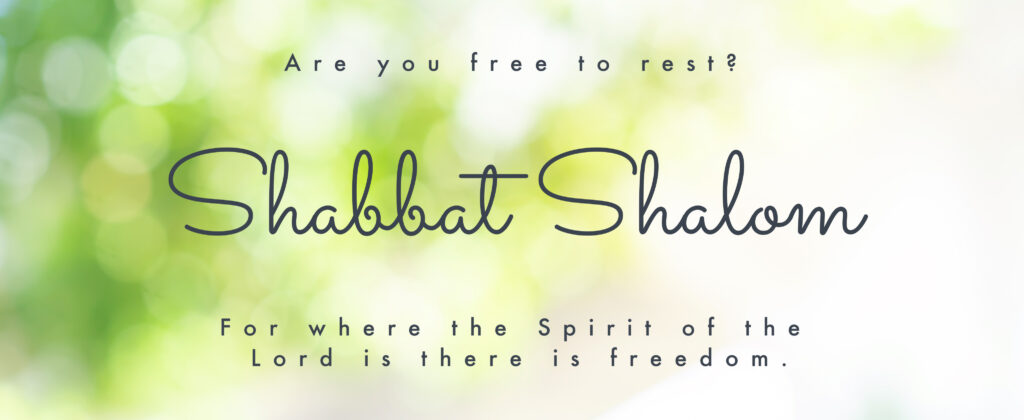Sabbath, Shabbat, is so much more than just a mandated period of time set aside for people to stress over things they can’t do while forcing themselves to sit still and “honor the Lord”.

People who don’t have time to Sabbath often find themselves overworked, exhausted, anxious, and filled with resentment over all the things that demand their time. That is who I was before I was given the opportunity to set aside the Sabbath as an immovable object in the way I live and function here on earth.
Free men get to self-determine. Slaves are bound to the will of their master. Free men can take a day off. Slaves never do.
If you can’t take a day off? You aren’t as free as you think you are.
The Seventh Day of Rest, Shabbat, is a reflection of the heart of YHVH. In the beginning, He took a pause from His creative work to enjoy what His hands had created. Specifically, He looked at mankind and was pleased with us. We are very good to Him.
The longer I study Torah, seeking to examine Scripture with an open heart, the more I am reminded how relational our heavenly Father is. His purpose in creating and seating us in the midst of a beautiful, luscious garden was to provide us with the atmosphere to be enjoyed while we grow and enjoy His fellowship. Adam and Eve, the first of humanity, were placed in perfection and their only requirements were to have dominion over His creation and walk with each other and with Him.
It was literally their occupation to manage His creation and to be available for communion with God.
We all know the story. They chose otherwise and that perfect world was plunged into chaos and anguish. The fall of man led to pain and death, separation and isolation, fear, and darkness. Cast from the garden into hard work, sacrifice, and, most profoundly, alienation from the Creator, it seemed as though all was lost.
But God…
The most profound statement in all of human history.
God was not willing for us to remain in isolation and distress. He immediately began implementing His plan for redemption. An eternally hopeful divine way of reconciling his now fallen creation with Himself in holiness and relationship. This plan had been in the works from the beginning.
The idea of Sabbath rest permeates Scripture. From the creation account to Hebrews we are consistently reminded that peace and rest are His design for us and striving and pain are aspects of the will of man in tangible practice.
Sabbath is where life begins. Quietly, peacefully, intentionally walking with Him in the moments He set aside. Sabbath was made for us.
In Matthew 12 Yeshua is found walking through fields as His disciples, the cohanim, began eating of the grain because they were hungry. Predictably, the leading religious leaders soundly rebuked Him and tried to find fault with Him.
His reply?
“If you knew what ‘I want compassion rather than animal-sacrifice’ meant, you would not condemn the innocent. For the Son of Man is Lord of the Shabbat!” (Matthew 12:7-8)
They were “harvesting” on the Sabbath!!!! How could they be innocent? And what does compassion, animal sacrifice, picking a few grains on Saturday, and Yeshua have in common anyway?
Life.
The cohanim were hungry so they ate. He had compassion on them to preserve their life. He didn’t require more effort, more loss, more blood. More works. He chose to have compassion on them.
Who has the authority to define the Sabbath?
Only the One who set this day apart, the Creator of the Sabbath, Himself, can define this day and make declarations about it.
Of all the things we often try to make Sabbath mean when explaining ourselves to people who have no revelation of this truth, do we share the life our Messiah chose to focus on? He chose Life. Because it’s all about life. It’s always been about life.
The animal sacrifice, the very first one, was at the time of Adam and Eve’s fall. The animal’s blood, a foreshadowing of Messiah’s sacrifice and redeeming blood, covered their sin, the furs covered their shame, and, as they were cast out, their lives began to count down.
Only the Lord of the Sabbath could say otherwise. Only the One who would redeem them could possibly intervene and transform their bleak new normal into a glimpse of the Garden.
As centuries progressed and the observance of Torah went from story to myth to legend in the minds and hearts of men the importance placed on rote symbology took the place of the original relationship. Mankind chose to forget the time when a grieving Father covered His children both figuratively and literally, and began the work of tirelessly pursuing them to restore relationship with Him and the hope of life everlasting.
Yeshua staked His claim on Shabbat. It wasn’t the 3rd day or the 6th day or the 2nd. It was the 7th day and it mattered to Him. It mattered enough for him to take that moment of admonition and move from the field to the synagogue where they sat in pious observance. In His authority He healed the man with the shriveled hand and once more affirmed the importance God places on human life.
“Looking for a reason to accuse him of something, they asked him, “Is healing permitted on Shabbat?” But he answered, “If you have a sheep that falls in a pit on Shabbat, which of you won’t take hold of it and lift it out? How much more valuable is a man than a sheep! Therefore, what is permitted on Shabbat is to do good.” (Matthew 12: 10b-12)
This day matters to Him and, its original intent, to reflect upon His creation and enjoy His company, to bring life, had been perverted into a wall of text and more rules than one would think possible for a single 24 hour period. This was the heavy sacrifice that brought death to relationship and judgment instead of compassion.
The elevation of man’s ideals over the significance of humanity’s relationship with their Faithful Creator desecrated the covenant He was devoted to restoring.
This hopeless idealism manifests in our brokenness, our spiral toward death. We have spent millennia wandering away from the Garden of His care and His fellowship.
Hosea 6:6 is a difficult passage. The Lord clearly and precisely reveals the waywardness and rebellion of His people. They had broken the covenant. Murder, greed, faithlessness, immorality… Struck down, cut to pieces by the Lord, they were a grotesque shadow of their promised identity if they had only obeyed. Their sins led them to atrocities but His heart remained the same and He was faithful enough to keep them from continuing beyond their ability to return.
He wants relationship through the intangibles of mercy, compassion, love and the touch-stones of conscious obedience as we commit ourselves to the knowledge of YHVH through his Torah and the rest of Scripture.
Both of those elements, Spirit and Truth, come from an intentional pursuit of being restored to relationship with the Creator. All that is necessary for abundant life.
And since the whole point of our faith is to LIVE, then it seems a simple transition that truly living starts with making time for Him and meeting Him when He is ready to be found.
“Seek Adonai while he is available,
Isaiah 55:6
call on him while he is still nearby.”
He is found by those who seek Him. He is found within His appointed times. Sabbath, the New Moon, His Feasts.
“For in six days, Adonai made heaven and earth, the sea and everything in them; but on the seventh day he rested. This is why Adonai blessed the day, Shabbat, and separated it for himself.” Exodus 20:8
We don’t make it holy. To think that we, as we are, can be invited to participate with Him is amazing. We don’t deserve it. But we desperately need it.
We have been invited to enter into a holy space in time to be renewed and refreshed. To find life again in a culture, a sinful world, steeped in death. Our Creator knows we need rest and communion and, for those who walk in it, the benefits cannot be overstated.
We don’t reconcile ourselves to God, we couldn’t possibly. He took that on and redeems us through His blood. This is unchangeable truth. Yet we tend to lose direction, wander, find other things that fill our minds and lives. The observance and keeping of a weekly, physical, practical Shabbat reorients our lives to a posture that keeps our focus on Him, the bringer of life, and the One who has never given up on our redemption.
He is our Salvation. Our Shalom. Our Rest. Our Hope.
Our Sabbath peace.
Shabbat Shalom.
